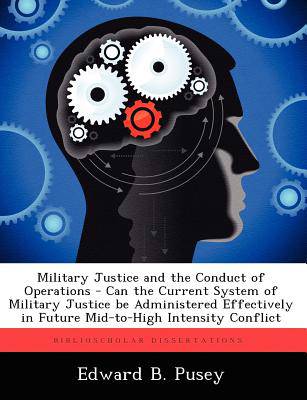
- Retrait gratuit dans votre magasin Club
- 7.000.000 titres dans notre catalogue
- Payer en toute sécurité
- Toujours un magasin près de chez vous
- Retrait gratuit dans votre magasin Club
- 7.000.0000 titres dans notre catalogue
- Payer en toute sécurité
- Toujours un magasin près de chez vous
Military Justice and the Conduct of Operations - Can the Current System of Military Justice Be Administered Effectively in Future Mid-To-High Intensit
Edward Bouverie Pusey
Livre broché | Anglais
78,95 €
+ 157 points
Description
This study compares the system of military justice that existed during World War II with the present system. As a basis for comparison a framework is established which looks at three different aspects of the military justice system. The first examines the main characteristics of the military justice system. The second looks at the 'due process' rights of a military offender. The third and last addresses the organization and capabilities of past and present Staff Judge Advocate Sections at division level and below. The overarching context in which this comparison is made is the tempo of operations and the combat environment as it existed during the European Campaign, and under the conditions for future mid-to-high intensity conflict as outlined in the Army's warfighting doctrine, FM 100-5, Operations. AirLand Battle Doctrine envisions the future mid-to-high intensity battlefield as chaotic, intense, and highly destructive. To successfully support commanders in their efforts to maintain law, order and discipline, the requirements for the administration of the military justice system must be flexible enough to meet the challenges resulting from the tempo of operations and the combat environment. The system should also be able to function without undermining the 'due process' rights of soldiers. Research reveals that the 'due process' rights of the soldier have been significantly enhanced since World War II. The addition of these rights has added to the complexity of the administration of the military justice system. There is no evidence that the anticipated tempo of future operations and combat environment were taken into consideration when changes occurred to the military justice system. This study concludes that the current system of military justice will not affect commander's ability to conduct operations but, combat operations could affect significantly the administration of the military justice system.
Spécifications
Parties prenantes
- Auteur(s) :
- Editeur:
Contenu
- Nombre de pages :
- 112
- Langue:
- Anglais
Caractéristiques
- EAN:
- 9781249372837
- Date de parution :
- 13-09-12
- Format:
- Livre broché
- Format numérique:
- Trade paperback (VS)
- Dimensions :
- 189 mm x 246 mm
- Poids :
- 213 g

Les avis
Nous publions uniquement les avis qui respectent les conditions requises. Consultez nos conditions pour les avis.






